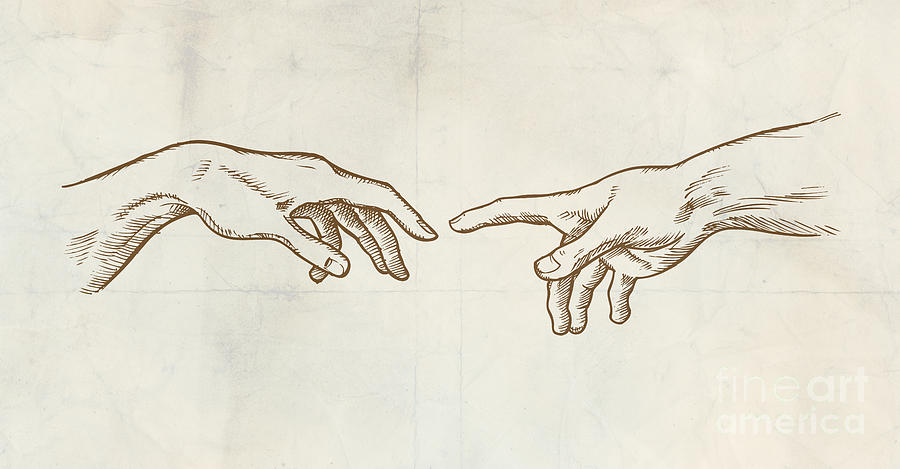Thursday in the 2nd Week of Easter
Acts 5:27-33; Ps 34; John 3:31-36
Recalling the one year of service as a Deacon (the root word of which is diakonia or service), I find myself ever more grateful for the Lord who called me to this state of life. Today’s readings focus on obedience – where Peter reminds us that “‘Obedience to God comes before obedience to men,” with John the baptist following up by telling us that our obedience and belief in God will lead us to eternal life. Obedience is often seen in concert with an exercise of will – an intellectual assent to God and choosing to act based on this assent.
This narrative of obedience seems to place a measure of control upon us – we choose to obey God (or sometimes not). While that’s true to an extent, it’s also true that our ability to obey doesn’t come from intellectual sources but from our experience of God’s goodness. Peter spoke of us being “witnesses” to the action of the Holy Spirit, just as Jesus is described to have been witness to what he had seen and heard. We obey because we’ve felt God’s graces, seen and heard witness from each other, and as the psalmist wrote, tasted and seen the goodness of God. It’s not our initiative but God’s, who laid out the wonders for us to savour. And our response is to obey this call to serve because that’s the only possible response from our hearts to the goodness that we receive.
Allow me some measure of self-indulgence as I share a little reflection of the ordination experience that I shared with the Jesuits of our Malaysia-Singapore Region last year.
Lying prostrate on the floor of the Church of the Gesù with choruses of ‘Prega per noi’ (Pray for us) washing over us was one of the most unforgettable moments of my life. Knowing that hundreds of people directly behind us were praying and invoking the intercession of all the saints brought much consolation and confidence that we might be able to live up to the lofty promises just made, because there were indeed many praying with and for us. That is how I’d like to remember the Litany of the Saints during the ordination but the reality is that there were many times during the prayer where the reality of the cold marble floor intruded into my consciousness and all I could think about during those times was how cold the floor was and how we should have opted for carpets to be placed in that area. Somewhat absurd as this juxtaposition might seem, I found it an apt description to my own personal reaction to the ordination and how the divine and the mundane seem to come together in my own all-too-human efforts at responding to God.

In the days leading up to 23 April 2019, I grew more and more aware of the number of people praying for the 12 of us who were to be ordained and this made me even more conscious of both the need for and the efficaciousness of the prayers of others. Not only was this palpable during the vigil prayers and ordination mass proper, there was a lingering sense of consolation that, to me at least, felt like it could have come from no other place than the prayers of others. It was humbling to actually feel how many were lending their spiritual support to us and to recognise how reliant we are on the prayers of others. I knew about the efficacy of such prayers before but never felt them as strongly as I did before – perhaps it was just the grace of the period of preparation that allowed this insight but perhaps it was the Lord nudging me away my normal state of mundane self-reliance to an acknowledgement of my being in the larger Christian community and how that helps sustain our vocation. The fuller (juridical) integration into the life of the Church that comes with the ordination thus also brought me to a fuller spiritual integration into the community. For that, I’m grateful.
During the reception after the ordination, amidst the munching on the tasty Mediterranean snacks, several friends very solicitously but with great curiosity came up to me and asked, ‘So we saw you wiping your eyes during the mass…what happened?’ The response was one that surprised me too – and leads to a slightly longer story that reminds me how God constantly surprises us, despite ourselves. During the rehearsal, Fr Massimo Marelli, the liturgist of the EUM (European- Mediterranean, formerly Italian) Province remarked that the Litany of the Saints is one of the most moving moments of the liturgy that is the frequent source of tears of many an ordinandi. Remembering this, I had a handkerchief at the ready while I was prostrate on the cold marble floor but moved as I was, the waterworks were off at that moment. On hindsight, I realise that that was probably due to something overly anticipated and my own propensity towards overthinking. But surprises were in store. Almost immediately after being vested by Fr Chris Soh and upon turning around to face the altar, the tap turned on and out came the hitherto unused handkerchief. I’ve no explanation for the tears – was it the extremely moving hymn that was sung at the time; the symbolic weight of the dalmatic that I was vested with; the turning to face the altar that I would soon be serving at…the list goes on. That moment was probably the most moving part of the liturgy for me as I felt, in a very real and very significant way, the consoling action of God in my life and how this was and has always been part of the journey in the Society for all these years.







